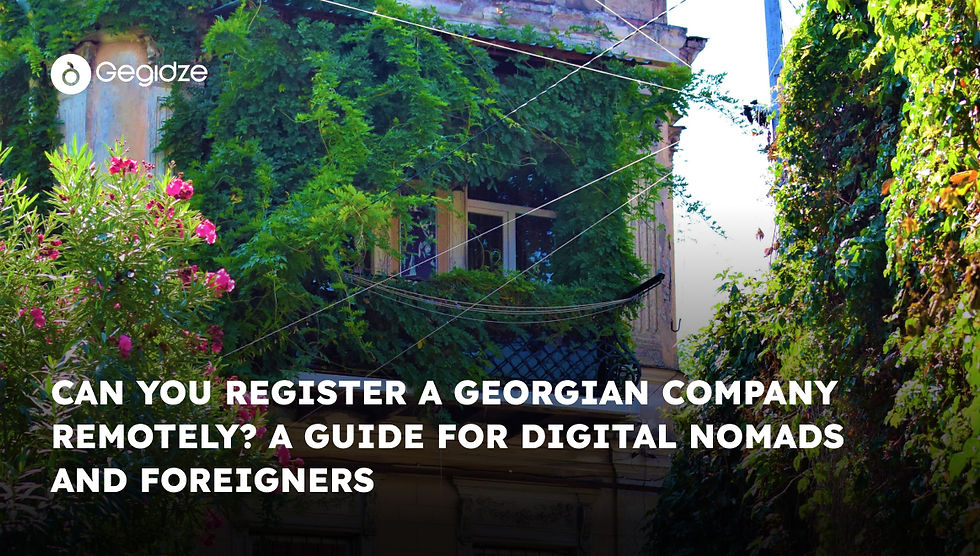Tax Haven Your Competitors Don’t Want You To Know About: How to Optimise Taxes for Freelancers
- Tinatin Tolordava
- Aug 22, 2025
- 10 min read

Table of contents
Why Taxes Make or Break Freelancers
Freelancing looks glamorous from the outside. Work from your laptop. Choose your clients. Invoice in euros or dollars.
But the less glamorous part arrives each month when taxes knock on the door. Suddenly, your freedom comes with 20, 30, sometimes 40% gone before you even touch your earnings.
That is why choosing the right tax system matters just as much as choosing the right client. And here is the twist: if you are a freelancer in Georgia, you have one of the best systems in the world at your fingertips.
In Georgia, freelancers can legally pay as little as 1% tax on turnover. Not profit. Turnover. Imagine sending an invoice for $3,000 and paying only $30 in tax. That is not a fantasy. It is how the Georgian system works when you register as an Individual Entrepreneur with Small Business Status.
And the opportunities do not stop there. As your freelance business grows, you can move from IE to an LLC or even combine your setup with Georgian tax residency. Each step opens new ways to keep more of what you earn and still stay fully compliant.
So if you are tired of watching taxes drain your freelance income, this is the guide for you.
How Freelancers Fit Into Georgia’s Tax System

Georgia’s tax model is different from many Western countries. It is based on a territorial system, which means the government only taxes income that is sourced in Georgia. If your clients are abroad, Georgia often does not tax that revenue at all. This makes freelancing for foreign clients especially attractive here.
Here are the main tax categories a freelancer should know:
Standard income tax for individuals: 20% on salaries or income if you do not register as an IE.
LLC in Georgia: 15% corporate tax on distributed profits, 18% VAT on most services, and 5% dividend tax.
With Virtual Zone status, foreign IT income can be exempt from corporate tax.
For freelancers, the IE with 1% tax is usually the first choice. But LLCs and tax residency can become important as your career grows.
Individual Entrepreneur (IE): The Freelancer’s Best Friend
If there is one tax status freelancers in Georgia love, it is the Individual Entrepreneur with Small Business Status.
Why it works so well
1% tax rate on turnover. If your income is 100,000 GEL, you pay just 1,000 GEL in tax.
Simple reporting. One short declaration each month, no endless paperwork.
Fast registration. It usually takes one day to register at the Public Service Hall.
Who qualifies
Any freelancer or self-employed person with annual turnover below 500,000 GEL.
You must work in an allowed industry. High-regulation industries like banking, insurance, or large-scale trade are excluded.
You must register as an IE with the Georgian Revenue Service.
The reality of hitting the limit
The 500,000 GEL limit sounds generous, but many successful freelancers eventually cross it. At that point, the tax rate jumps to 3% on the extra amount. If you consistently go over, you may need to move to an LLC structure.
How Gegidze fits in
The registration process looks simple, but it can get messy fast if your documents are not in Georgian. Apostilled documents, passports, and contracts often require certified translation English Georgian or translate German to Georgian. Many freelancers try Google translate English to Georgian, but that is not accepted by the authorities. Gegidze makes sure every word is legally valid and notarised.
When Freelancers Choose an LLC

Some freelancers prefer to skip IE status and register an LLCin Georgia from the start. Why?
It gives more credibility with international clients.
It allows you to bring in partners or investors.
It can scale more easily if you start hiring staff.
Taxation of LLCs in Georgia
15% corporate tax on distributed profits. If you reinvest, you do not pay.
18% VAT on local services if you pass the threshold.
5% dividend tax when you pay yourself.
This is still competitive compared to Western Europe. And if your LLC qualifies for Virtual Zone status, then foreign-sourced IT revenue is completely exempt from corporate tax and VAT.
For example, a freelance software developer who grows into a micro-SaaS startup could register an LLC with Virtual Zone status. Their entire foreign client revenue remains tax-free at the corporate level. They only pay 5% when distributing dividends.
Georgian Tax Residency and Why It Matters for Freelancers
Taxes are not just about your business. They are also about where you, as an individual, are considered a tax resident.
In Georgia, if you spend 183 days or more in a 12-month period, you become a Georgian tax resident. That means your worldwide personal income can be taxed in Georgia.
At first glance, that sounds like a risk. But for many freelancers, it is an opportunity.
Georgia applies a flat 20% personal income tax. If you come from a country with higher personal tax rates, becoming a Georgian tax resident can cut your personal tax bill dramatically.
Georgia has double taxation treaties with over 50 countries. If you are a tax resident in Georgia, these treaties often protect you from paying tax twice on the same income.
For freelancers who own an LLC with Virtual Zone status, Georgian tax residency means you can pay yourself dividends at only 5%, with no extra Georgian tax on top.
Imagine this scenario: you are a German freelancer paying over 40% in taxes at home. You move to Tbilisi, register as an IE with 1% tax, and spend more than 183 days in the country. Now your freelance taxes are based on Georgia’s much lighter system.
This combination of IE, LLC, and tax residency is one of the most powerful tools freelancers can use. But it requires planning, and the rules change depending on your home country’s agreements. This is exactly the kind of puzzle Gegidze solves for clients every day.
VAT, Payroll, and the Hidden Details Freelancers Miss
It is easy to think freelancers only need to care about income tax, but there are other layers.
VAT
If your annual turnover exceeds 100,000 GEL, you may need to register for VAT. The standard rate is 18%. But if all your clients are abroad, you may not need to charge VAT at all. This is where the territorial system helps. Still, understanding when you must file VAT returns is essential.
Reverse VAT
Even if you are not registered for VAT, you may need to pay reverse VAT when you buy certain services from abroad. For example, if you use foreign software subscriptions, the Georgian tax code may treat it as a taxable purchase.
Payroll taxes
What if you hire a local assistant, designer, or translator to help with your freelance projects? The moment you employ someone in Georgia, payroll obligations begin:
20% income tax on salaries
2% pension contribution from the employer
2% pension contribution from the employee
This is why even freelancers sometimes need payroll systems. Gegidze helps set up withholding tax registration so freelancers stay compliant.
Banking and Payments: Why It Matters for Freelancers
For freelancers working with international clients, getting paid smoothly is as important as tax rates. That is why banking in Georgia is a crucial part of the setup.
Bank of Georgia and TBC Bank
These two banks dominate the market. Both provide:
Multi-currency accounts (USD, EUR, GBP, GEL)
IBAN numbers for international transfers
Online banking in English
Swift codes for global payments
Opening an account usually requires certified translations of your documents. Again, trying to use online translation tools like Google translate Georgian to English will not help.
Banks require official English to Georgian translation with notarisation. Gegidze handles this step to avoid delays.
With a Georgian bank account, freelancers can send professional invoices with local bank details and get paid directly in euros or dollars. No need for middlemen or complicated payment services.
Comparing Taxes with Other Costs in Georgia

Taxes are only part of the story. For freelancers, the real question is: how much of your income can you actually keep and enjoy?
Georgia has a unique advantage here. Low tax rates combine with a cost of living that lets freelancers stretch their earnings much further than in most European capitals.
Apartments in Tbilisi Georgia range from affordable studios starting around $300–400 per month to modern city-centre apartments closer to $700–900.
Food and cafés are inexpensive compared to Western Europe. A freelancer can eat out regularly without it breaking the budget.
Transport is cheap and reliable, whether you take metro, buses, or taxis.
Co-working spaces are modern and reasonably priced, often with internet speeds above 100 Mbps.
Now add property taxes to the mix. In many European countries, property tax becomes a lifelong burden. In Georgia, it is capped at 1% of the property’s market value — and only applies if your global annual income is above 40,000 GEL.
Here’s a quick comparison:
Category | Georgia | Western Europe (average) |
Freelancer income tax (IE) | 1% turnover up to 500,000 GEL | 20–40% on profit |
Property tax | 0–1% depending on income level | 1–3% annually |
VAT on services for foreigners | 0% (exported services) | 19–23% average VAT rate |
Cost of rent (capital city avg.) | $400–800 per month | $1,200–2,500 per month |
With this combination, freelancers in Georgia not only pay less in taxes but also spend less to maintain a comfortable lifestyle.
Common Mistakes Freelancers Make
Even with such a favourable system, many freelancers trip over avoidable mistakes. These errors often cost far more than the taxes themselves.

Skipping registration
If you live in Georgia and work with clients, you need to register as an Individual Entrepreneur. Without it, your freelance income may be taxed at the standard 20% personal income tax instead of the 1% IE rate.
Forgetting about the 500,000 GEL limit
The IE regime is generous, but it is not unlimited.
Income up to 500,000 GEL is taxed at 1%.
Income above that threshold can be taxed at 3%.
Consistently crossing the limit may lead to loss of Small Business Status.
A freelancer scaling into higher income brackets should consider switching to an LLC.
Bad translations
Every official document in Georgia must be in the Georgian language. That includes:
Bank account applications
Registration forms for the Revenue Service
Powers of attorney
Client contracts if submitted for legal recognition
Trying to cut corners with Google translate English to Georgian or similar tools is not accepted. Only certified English to Georgian translation or German to Georgian translation will work.
Mixing personal and business finances
Freelancers who use personal accounts for business face messy bookkeeping. International clients also take you more seriously when you provide invoices tied to a proper business account at Bank of Georgia, TBC, or Liberty Bank.
How Gegidze Helps Freelancers
Gegidze steps in where freelancers most often struggle. Instead of fighting with paperwork, you get a clear structure handled by people who know the system inside out.
Here’s what we do for freelancers:
Register you as an IE or LLC
IE with 1% Small Business Status for solo freelancers
LLC registration for those planning to scale or apply for Virtual Zone status
Certified translations and notarisation
Translation English to Georgian
Translation German to Georgian
Notary approval for all required documents
Banking setup
Opening accounts with Bank of Georgia, TBC, or Liberty Bank
Ensuring multi-currency access (USD, EUR, GBP, GEL)
Setting up IBAN and swift transfers for international clients
Payroll support
Withholding tax registration
Monthly payroll compliance if you hire staff
Managing the 20% salary tax and pension contributions
Tax residency planning
Guidance on the 183-day rule
Evaluating if Georgian tax residency reduces your overall global tax bill
Applying double tax treaties to avoid paying twice
Freelancers who work with Gegidze not only pay less tax, they also save time, avoid legal errors, and gain credibility with their clients.
The Smarter Way Forward for Freelancers

Being a freelancer does not mean financial instability. In Georgia, it can mean building a simple, predictable, and low-cost tax system that grows with you.
Picture this:
You start as an IE with 1% tax, handling international clients as a one-person business.
As your income rises, you form an LLC and apply for Virtual Zone status, paying 0% corporate tax on foreign IT services.
When you spend enough time in the country, you become a Georgian tax resident, using double tax treaties to optimise your personal income taxes too.
Each step builds on the last, giving freelancers both flexibility and long-term stability.
Ready to Optimise Your Freelance Taxes?
If you are freelancing with international clients, Georgia is one of the smartest places to register and grow your business. The key is setting up correctly from the start, with certified translations, proper registration at the Revenue Service, and the right banking structure.
That is what Gegidze does every day. We register your business, secure your 1% IE status or LLC structure, set up your banking, and plan your tax residency.
Book a free consultation with Gegidze today. Let us take care of the details so you can focus on clients, growth, and keeping more of your income.

Frequently asked questions (FAQ)
What is the tax rate for freelancers in Georgia?
Freelancers who register as Individual Entrepreneurs (IE) with Small Business Status pay only 1% tax on turnoverup to 500,000 GEL per year. If your income passes that threshold, the excess can be taxed at 3%. Without registration, freelance income is taxed at the standard 20% individual rate.
Can foreigners register as Individual Entrepreneurs in Georgia?
Yes, foreigners can register as Individual Entrepreneurs in Georgia. You will need to provide identity documents and certified translations into Georgian. This often requires professional translation English to Georgian or translation German to Georgian, as Google Translate or similar tools are not valid for official use.
Do freelancers in Georgia need VAT registration?
Freelancers are required to register for VAT if their annual turnover exceeds 100,000 GEL. However, VAT does not apply to services exported abroad, which means many freelancers working with international clients can operate without charging VAT.
How does Georgian tax residency affect freelancers?
If you spend 183 days or more in Georgia within a 12-month period, you qualify as a Georgian tax resident. That means your global income may become taxable in Georgia. For many freelancers, this is still advantageous, as Georgia applies a flat 20% personal income tax and has double tax treaties that prevent paying twice.
Can freelancers open business accounts with the Bank of Georgia?
Yes. Freelancers can open both personal and business accounts at the Bank of Georgia, TBC Bank, or Liberty Bank. Business accounts make it easier to invoice international clients and receive payments in USD, EUR, GBP, or GEL. Most banks will require translated documents such as passports and registration papers.
What happens if a freelancer does not register properly?
If you live in Georgia but do not register your freelance activity, your income may be treated as personal income and taxed at 20% instead of 1%. You could also face penalties for failing to comply with Revenue Service Georgia regulations. Registration with certified Georgian translations ensures you get the 1% tax benefit and remain compliant.


